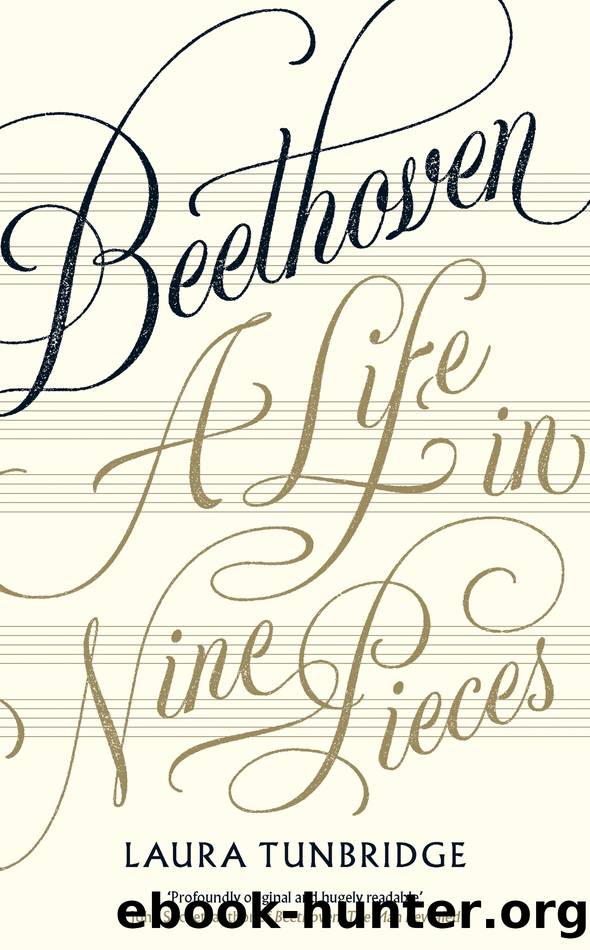Beethoven by Laura Tunbridge

Author:Laura Tunbridge [Tunbridge, Laura]
Language: eng
Format: epub
ISBN: 9780241987452
Publisher: Penguin Books Ltd
Published: 2020-05-15T00:00:00+00:00
6. Liberty: Fidelio, op. 72 (1814)
In celebration of the allied armiesâ very recent victory over Napoleon in France, on 11 April 1814 there was a performance at Viennaâs Kärtnertortheater of Die gute Nachricht (The Good News). Bruno, a local landlord, has promised his daughter Hannchenâs hand in marriage to whoever brings the longed-for news that Paris has fallen. Fortunately for Hannchen, her beloved Robert beats his rival by using her fatherâs white dove to deliver the message to the villagers, who break into song: âGermania! Germania!â
Die gute Nachricht had been hastily devised by playwright Georg Friedrich Treitschke. It is a Singspiel, a type of German opera with spoken dialogue, and, appropriately, was a display of Viennese musical talents, with arrangements of numbers by Johann Nepomuk Hummel, Joseph Weigl, Adalbert Gyrowetz, Friedrich August Kanne, and some re-purposed Mozart. The concluding chorus was newly composed by Beethoven.1 Amid its celebration of German virtues, Treitschkeâs five verses for âGermania!â namecheck the newly victorious allied leaders: Russiaâs Czar Alexander, Friedrich Wilhelm of Prussia and, finally, the Austrian emperor, Franz. The musicâs popularity is apparent in the decision to publish it immediately in piano arrangement, and the rousing chorus was successful enough to be used in performances of Treitschkeâs next production, Die Ehrenpforten (The Gates of Glory), given in honour of the emperorâs name day. (This was a Catholic tradition by which children would be named according to the calendar of saintsâ feasts, which was extended to certain names being celebrated on certain dates. In an era when birth dates could be uncertain â as was the case with Beethoven â name days were reliable party prompts.) On sending a copy of the piano version of the chorus to Archduke Rudolph, Beethoven made the grand claim that âthe song âGermania!â belongs to the whole worldâ.2
As well it might have seemed. Napoleon had finally been forced to abdicate and was exiled to the island of Elba. Statesmen and royalty arrived in Vienna in the autumn of 1814 at the invitation of Emperor Franz. As diplomats negotiated the future of Europe, lavish entertainments were put on for visitors. Sixteen thousand candles illuminated the opening ball at the Imperial Riding School (see fig. 6.1). The next night Austriaâs Chancellor, Klemens Metternich, hosted a ball for visiting sovereigns. Troops welcomed them to strains of military music and a short play was performed in a copse arranged as an amphitheatre. They were then taken through a reconstructed Russian village, complete with cheering peasants. At the end of a ballet danced on a flower-strewn lawn, bouquets were laid at the feet of the royals, accompanied by songs of joy and devotion. Military drills were the final display before the guests entered a newly erected ballroom, decorated with garlands of flowers. After fireworks, the ball began, and supper was served to 150 of the most distinguished guests on a silver service said to be worthy of a king. The following morning, they went hunting â shooting more than one hundred wild boar â and then moved on to a nearby castle and yet another ball.
Download
This site does not store any files on its server. We only index and link to content provided by other sites. Please contact the content providers to delete copyright contents if any and email us, we'll remove relevant links or contents immediately.
Machine Learning at Scale with H2O by Gregory Keys | David Whiting(4313)
Never by Ken Follett(3957)
Harry Potter and the Goblet Of Fire by J.K. Rowling(3857)
Fairy Tale by Stephen King(3399)
Unfinished: A Memoir by Priyanka Chopra Jonas(3389)
The Man Who Died Twice by Richard Osman(3079)
Will by Will Smith(2920)
It Starts With Us (It Ends with Us #2) by Colleen Hoover(2367)
Rationality by Steven Pinker(2364)
Can't Hurt Me: Master Your Mind and Defy the Odds - Clean Edition by David Goggins(2341)
The Dark Hours by Michael Connelly(2308)
The Storyteller by Dave Grohl(2236)
Friends, Lovers, and the Big Terrible Thing by Matthew Perry(2230)
The Dawn of Everything: A New History of Humanity by David Graeber & David Wengrow(2209)
The Becoming by Nora Roberts(2202)
The Stranger in the Lifeboat by Mitch Albom(2121)
Cloud Cuckoo Land by Anthony Doerr(2113)
Love on the Brain by Ali Hazelwood(2078)
Einstein: His Life and Universe by Walter Isaacson(2022)
